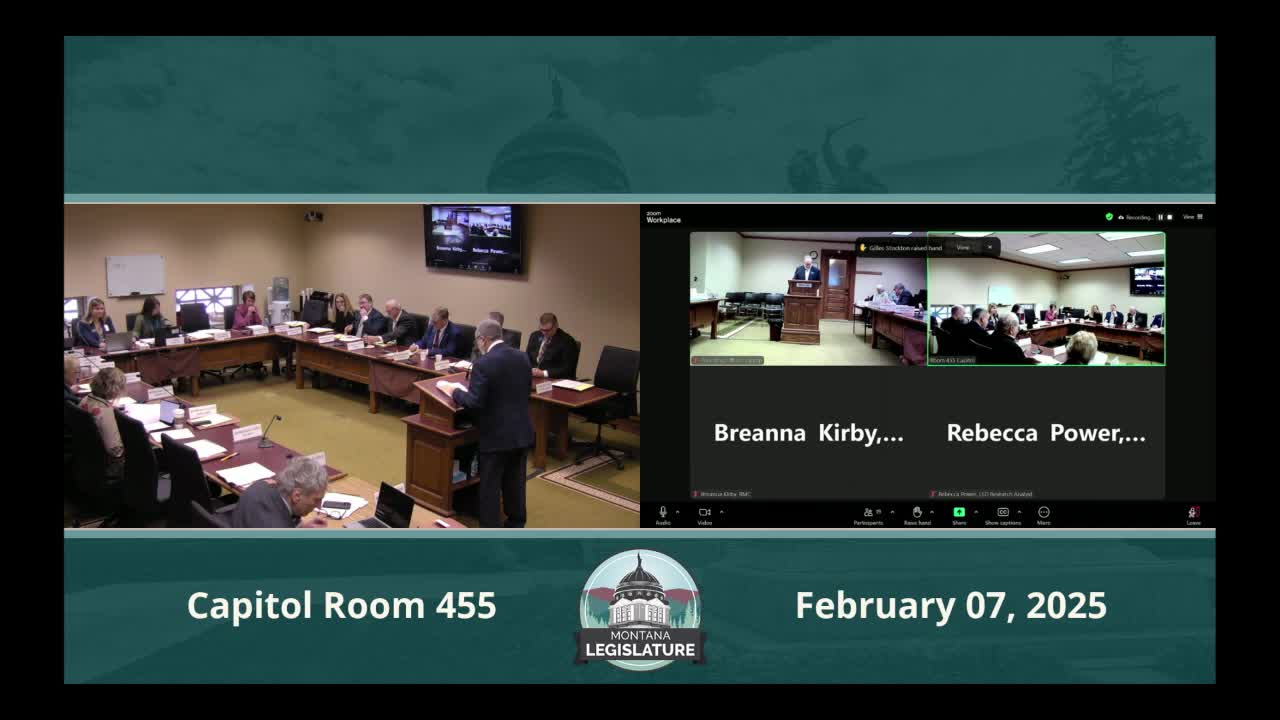House State Administration panel holds hearing on HJ 11 urging constitutional amendment to curb corporate election spending
Get AI-powered insights, summaries, and transcripts
Subscribe
Summary
The House State Administration Committee opened a hearing on House Joint Resolution 11, which asks Congress to propose a constitutional amendment to overturn the Supreme Court’s Citizens United decision and limit corporate and outside spending in elections.
HELENA — The House State Administration Committee opened a hearing on House Joint Resolution 11 on the floor of the Montana Legislature, where the resolution’s sponsor and a broad group of proponents urged Congress to propose a constitutional amendment to overturn the U.S. Supreme Court decision known as Citizens United.
Representative Staffman, the sponsor (House District 59), told the committee HJ 11 would "call on the United States Congress to consider a constitutional amendment" to address unlimited spending by corporations, unions, political action committees and super PACs in federal elections. "We're flooded with money. A lot of it is dark money," Staffman said during the sponsor's opening remarks, citing a sharp rise in outside spending in recent cycles.
Supporters who testified in person and by remote connection told the committee the measure is needed to restore citizen influence in elections and to reduce the volume of political advertising and outside spending. Derf Johnson of the Montana Environmental Information Center said the group "wants to see an end to Citizens United" and noted national increases in election spending. Sophie Moon of the Montana Public Interest Research Group said HJ 11 "would be a step in the right direction in addressing one of the most important public interest issues of our time, campaign finance reform." Several witnesses cited reporting that roughly $300,000,000 was spent in the 2024 Montana U.S. Senate race.
Why it matters: Witnesses said large outside spending drowns out ordinary voters, drives negative advertising and forces officeholders to spend time fundraising rather than governing. Multiple speakers also referenced Montana's history of stricter state campaign limits, noting the state's prior Corrupt Practices Act and the 2012 voter initiative I-166 as part of past efforts to limit corporate influence.
What proponents told the committee: Testimony emphasized three recurring points: (1) Citizens United (the 2010 Supreme Court decision) opened the door to large, often out-of-state spending that has grown dramatically since the ruling; (2) the scale of spending in recent cycles — frequently described in testimony as roughly $300 million in the last Senate race — has made campaigning more adversarial and costly; and (3) only a federal constitutional amendment, proponents said, can reverse the court's interpretation and allow states or Congress to limit corporate political spending.
Representative Staffman said HJ 11 includes an amendment to the original draft adding Montana-specific historical context about earlier state efforts to restrict corporate spending. Several speakers urged the committee to advance the resolution to the full House as an appeal to Congress to begin the constitutional amendment process.
Committee action: The transcript does not record a committee vote on HJ 11. At the close of the hearing, Representative Staffman concluded his remarks and asked members for a favorable vote, saying, "I close. Vote Green." The record shows a hearing and public testimony; no formal committee vote or final disposition of the resolution is recorded in the transcript provided.
Context and background: Witnesses referenced national and state figures used in testimony and public reporting. Speakers pointed to the 2010 Supreme Court decision Citizens United as the legal turning point that they said expanded political spending by corporations and other entities. Multiple witnesses referenced Montana’s past experience with the Corrupt Practices Act and the 2012 ballot initiative (I-166) as part of historical attempts to limit outside money in Montana elections.
What’s next: The committee did not record a vote in the provided transcript. If the committee advances HJ 11, the resolution would be a formal request to Congress to draft or consider a constitutional amendment; any amendment would then follow the federal process for congressional proposal and state ratification.
Ending: The hearing drew a sizable group of proponents, many highlighting the scale of recent outside spending in Montana races and urging lawmakers to move HJ 11 forward as a first step toward an eventual constitutional amendment.
